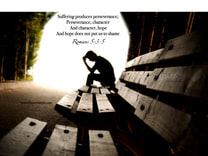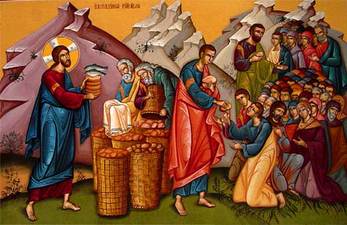|
“…we even boast of our afflictions, knowing that affliction produces endurance, and endurance, proven character, and proven character, hope, and hope does not disappoint, because the love of God has been poured out into our hearts through the Holy Spirit that has been given to us.”
Romans 5:3-5 A few weeks ago, during our celebration of the Solemnity of the Most Holy Trinity, this portion of St. Paul’s letter to the Romans was read to faithful Catholics throughout the world. I had the privilege of attending a bilingual Mass that weekend with my girlfriend, Kara, in a high school gymnasium. The different setting, unfamiliar language, and unusually large number of altar servers hardly crossed my mind as we participated in Mass at Most Holy Trinity Parish, on this, their solemnity. It was a beautiful liturgy to say the least! What struck Kara and me most about our experience, however, were these lines from the second reading: How many of us know someone who is afflicted? We all have family members, friends or colleagues that are struggling with cancer, unemployment, depression, etc. In the daily news - local, national and international - we hear about gun violence, war, natural disaster, and famine. Even more simplistically, we each have ‘good days’ and ‘bad days.’ St. Paul reminds us that affliction is not something to run from because ultimately, we “boast in hope of the Glory of God” (Romans 5:2). His ‘flow chart of hope’ is a reassuring message of what true faithfulness yields and how God makes His love present to each of us in our struggles. The alternatives to hope (sin, despair, discouragement, impatience, fear, anxiety, guilt…)_ when left unchecked, are a rejection of God’s invitation to deeper communion with Him. Very basically, this reading offers us a roadmap to understand how affliction does not have the final word; hope does! Pope Benedict XVI’s homily at Nationals Stadium during his 2008 Apostolic Visit to the United States speaks to this point: “It is a prayer of unfailing hope, but also one of patient endurance and, often, accompanied by suffering for the truth. Through this prayer, we share in the mystery of Christ’s own weakness and suffering, while trusting firmly in the victory of his Cross.” We are able to endure our own afflictions because of the hope promised to us by God. Pain, suffering, and struggle are not pleasant, especially when they are affecting someone we know and love. As people of faith, though, we believe God is with us, united in our affliction and made present to us in the love we experience. This faith, this hope, and this love, offer us momentary comfort and strength as we journey to the ultimate glory of complete communion with God. We have a common call to share this hope with those around us, especially with those who find it difficult to endure in times of struggle. This simple reminder of the universality of the Church also reminds us that through prayer, “we become capable of the great hope, and thus we become ministers of hope for others” (Spe Salvi, 34). And so, as we are confronted with affliction, our prayer should be one of hope. As others struggle with affliction, our response should be one of hope. And as we begin to question why affliction affects our lives, we must remember that affliction yields hope; hope in the love of God. “Hope, O my soul, hope. You know neither the day nor the hour. Watch carefully, for everything passes quickly, even though your impatience makes doubtful what is certain, and turns a very short time into a long one. Dream that the more you struggle, the more you prove the love that you bear your God, and the more you will rejoice one day with your Beloved, in a happiness and rapture that can never end.” St. Teresa of Avila, The Exclamations of the Soul to God, 15:3. Jonathan Jerome is the Director of Catholic Campus Ministry at the University of Pittsburgh Johnstown. Editor's Note: This post was originally published on June 13, 2013
1 Comment
“…we even boast of our afflictions, knowing that affliction produces endurance, and endurance, proven character, and proven character, hope, and hope does not disappoint, because the love of God has been poured out into our hearts through the Holy Spirit that has been given to us.” ~Romans 5:3-5
A few weeks ago, during our celebration of the Solemnity of the Most Holy Trinity, this portion of St. Paul’s letter to the Romans was read to faithful Catholics throughout the world. I had the privilege of attending a bilingual Mass that weekend with my girlfriend, Kara, in a high school gymnasium. The different setting, unfamiliar language, and unusually large number of altar servers hardly crossed my mind as we participated in Mass at Most Holy Trinity Parish, on this, their solemnity. It was a beautiful liturgy to say the least! What struck Kara and me most about our experience, however, were these lines from the second reading: How many of us know someone who is afflicted? We all have family members, friends or colleagues that are struggling with cancer, unemployment, depression, etc. In the daily news - local, national and international - we hear about gun violence, war, natural disaster, and famine. Even more simplistically, we each have ‘good days’ and ‘bad days.’ St. Paul reminds us that affliction is not something to run from because ultimately, we “boast in hope of the Glory of God” (Romans 5:2). His ‘flow chart of hope’ is a reassuring message of what true faithfulness yields and how God makes His love present to each of us in our struggles. The alternatives to hope (sin, despair, discouragement, impatience, fear, anxiety, guilt…)_ when left unchecked, are a rejection of God’s invitation to deeper communion with Him. Very basically, this reading offers us a roadmap to understand how affliction does not have the final word; hope does! Pope Benedict XVI’s homily at Nationals Stadium during his 2008 Apostolic Visit to the United States speaks to this point: “It is a prayer of unfailing hope, but also one of patient endurance and, often, accompanied by suffering for the truth. Through this prayer, we share in the mystery of Christ’s own weakness and suffering, while trusting firmly in the victory of his Cross.” We are able to endure our own afflictions because of the hope promised to us by God. Pain, suffering, and struggle are not pleasant, especially when they are affecting someone we know and love. As people of faith, though, we believe God is with us, united in our affliction and made present to us in the love we experience. This faith, this hope, and this love, offer us momentary comfort and strength as we journey to the ultimate glory of complete communion with God. We have a common call to share this hope with those around us, especially with those who find it difficult to endure in times of struggle. This simple reminder of the universality of the Church also reminds us that through prayer, “we become capable of the great hope, and thus we become ministers of hope for others” (Spe Salvi, 34). And so, as we are confronted with affliction, our prayer should be one of hope. As others struggle with affliction, our response should be one of hope. And as we begin to question why affliction affects our lives, we must remember that affliction yields hope; hope in the love of God. “Hope, O my soul, hope. You know neither the day nor the hour. Watch carefully, for everything passes quickly, even though your impatience makes doubtful what is certain, and turns a very short time into a long one. Dream that the more you struggle, the more you prove the love that you bear your God, and the more you will rejoice one day with your Beloved, in a happiness and rapture that can never end.” St. Teresa of Avila, The Exclamations of the Soul to God, 15:3. Jonathan Jerome is the Director of Catholic Campus Ministry at the University of Pittsburgh Johnstown. The night before I travel - whether by car, air or sea - I can’t help but begin to feel anxious and get a little overwhelmed about my upcoming journey. No matter how prepared I think I am or how necessary the trip is, I loathe the process of travelling. I’ve never had a ‘bad’ experience, but it isn’t something on my list of things to do every day either. While I’m sure I’m not alone in my sentiment, and there are probably 101 diagnoses as to why I don’t like travelling, I think it boils down to the fact that transition, no matter the circumstances, causes an upheaval of routine.
Throughout our lives, each of us has experienced the anxieties of transition in one way or another: graduating from school and starting a new job; getting married and having children; getting sick or losing a loved one. Every stage of our lives carries with it transition and to some extent, a change in routine. The Book of Ecclesiastes acknowledges this idea in a very poetic way: “There is an appointed time for everything, and a time for every affair under the heavens” (Eccl 3:1). The start of Ordinary Time is no different. While most of us would consider this transition as minimal, the truth is our ‘routine of solemnity’ has come to somewhat of a standstill for the next month. The Solemnity of the Presentation of the Lord (on February 2), and the memorial of Our Lady of Lourdes (on February 11) are among the highlights, but for the non-daily Mass crowd, they will be passed over with little thought. So, the question then becomes, what are we to make of these next few weeks? With less than a month before we begin our celebration of Lent with Ash Wednesday, many of us are tempted to ask what good these next four weeks of green - of Ordinary Time - truly serve? In fact, we might be tempted to brush them aside and regard them as a welcomed break in our otherwise hectic liturgical year. I would suggest, however, that looking at these next four ordinary weeks is essential to our spiritual well-being. Our Catholic faith has a rich history of using the ordinary to reveal the extraordinary. Our sacramental life is centered around the idea that ordinary elements - bread, wine, water, oil, gestures and even people - through the grace of God, constantly reveal extraordinary truths. Even in our secular day to day interactions, we believe that God reveals himself to us through the kind word or action of an ordinary passerby; oftentimes to our amazement. Both the Old and New Testaments tell countless stories of God using ordinary people to bring about His extraordinary plan of salvation: Abraham, Moses, David, Elijah, Elisha, Daniel, Jonah, John the Baptist, Peter and Paul, just to name a few. The lives of the saints and martyrs are no exception. Ss. Francis, Therese of Lisieux, Jerome, Vincent Pallotti, Elizabeth Ann Seton, Francis de Sales, among thousands of others, beautifully exemplify living ordinary lives for the sake of an extraordinary message. Knowing and understanding how God uses the ordinary should be a great source of hope for each of us. It is an invitation for each of us to strip away what we think we need to be and come as we are; in other words, for us to recognize the beauty of our own imperfect humanity. It is through our participation in the ordinary that we enter into a deeper, more honest and fruitful relationship with God, who is perfection. It’s true that this liturgical season, this transition, might bring about some uneasiness or anxiety because it is a break from our recent pomp and solemnity. For some, it might be a minimal, casual transition. And still for others, it might be off their radar completely. Whatever the case, I would suggest making these next four weeks truly ordinary. If we come as we are - as ordinary people - not just to reacclimate ourselves to a different routine, but to enter into an honest dialogue with God, I am confident He will use us in extraordinary ways. This kind of unique and authentic vulnerability is what we are called to, and why we were created. Why not take a little time to participate in it and enjoy it? On January 24th, we will celebrate the memorial of St. Francis de Sales. In his book, The Introduction to the Devout Life, he writes, “When God the Creator made all things, he commanded the plants to bring forth fruit each according to its own kind; he has likewise commanded Christians, who are the living plants of his Church, to bring forth the fruits of devotion, each one in accord with his character, his station and his calling… Therefore, in whatever situations we happen to be, we can and we must aspire to the life of perfection” (Pars 1, cap.3). As we begin this short period of Ordinary Time, we are reminded not of what we lack, but of why being ordinary is so necessary to bring about the extraordinary. We are reminded that each of us have been created as is, to bring about a life of devotion, not for our sake, but for the glory of God. In essence, we are reminded why the green of the thorn, eventually blooms into the white of the rose. Happy Ordinary Time! Jonathan Jerome is the Director of Catholic Campus Ministry at the University of Pittsburgh Johnstown. This past weekend, I had an opportunity to lead a day retreat for liturgical ministers at a local parish. It was a wonderful time of discussion, reflection and most importantly prayer. At one point amid our large group discussion I asked the question (much like Brett Garland in a recent post), “why are we Catholic in today’s society?” It was an unscripted, off-the-cuff question, but one that I thought would shed light on the importance of evangelization among the lay faithful. The answers were varied, but one stuck out in particular: an older woman said, “Because my parents were Catholic and raised me this way.” I challenged her to explain the answer by asking if her parents were the only reason she remained Catholic. Her answer was short and to the point: “No, my children are.”
The responses that this woman gave are two of the most basic, yet important teachings of our Catholic faith: “no one comes to faith alone” (CCC 166) and “we can’t give what we don’t have” (CCC 425). Throughout the history of the Church, we have seen time and again, that people bring others into relationship with God. Very rare are the days of the burning bush, but not so rare are the days of ordinary people leading others to the extraordinary truth that God exists. In my own life, I can credit my parents, campus ministers, members of my community, friends and now, my students, for helping me to discover God working in and throughout my life. It is with their witness (good and bad), their encouragement and their prayers that I have come to live my faith. What is even more telling, however, is that the faith we have is not ours to hoard. Our faith - that is our belief in a perfect, triune God who loves us unconditionally and is made present to us in the sacrifice of the Mass - is meant to be shared. For more than 2,000 years, the faith of our fathers has been handed on from generation to generation. Christ urged his disciples: “Go, therefore, and make disciples of all nations, baptizing them in the name of the Father, and of the Son, and of the Holy Spirit, teaching them to observe all that I have commanded you. And behold, I am with you always, until the end of the age” (Matthew 27:19-20). If every Sunday we profess belief in an ever-present God and we leave Mass with the intention to live our life transformed by His Word, then it is our obligation as baptized Catholics to share what we have been given. I’m reminded of a pertinent thought by Thomas Merton: “God has willed that we should all depend on one another for our salvation and all strive together for our own mutual good and our own common salvation.” Our faith and the faith of those around us should not be self-centered or self-contained, but rather, by virtue of our baptism, shared joyfully with every person we encounter. So, consider these thoughts: who has helped bring you to this point in your faith life? Have you thanked them for their witness, encouragement or prayers? And, when was the last time you shared your faith in an authentic and joyful way, so as to bring about “mutual good and our own common salvation?” Jonathan Jerome is the Director of Catholic Campus Ministry at the University of Pittsburgh Johnstown. |
Details
Archives
July 2024
Categories
All
|
About |
Media |
© COPYRIGHT 2024 | ALL RIGHTS RESERVED





 RSS Feed
RSS Feed